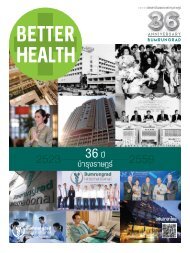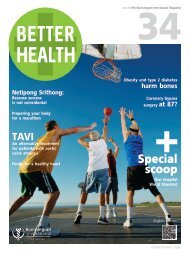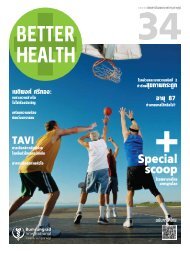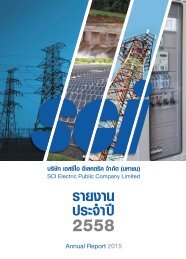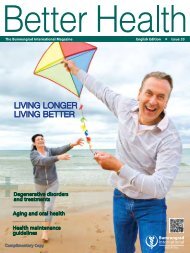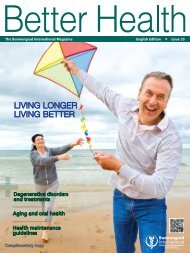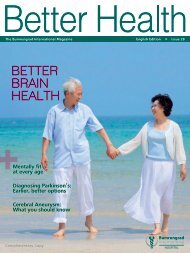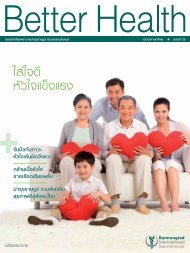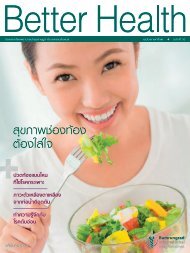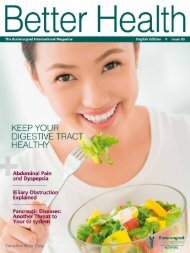Better Health 25 Eng
The magazine for patients and friends of Bumrungrad International Hospital, Thailand.
The magazine for patients and friends of Bumrungrad International Hospital, Thailand.
- TAGS
- bumrungrad
- hospital
- thailand
You also want an ePaper? Increase the reach of your titles
YUMPU automatically turns print PDFs into web optimized ePapers that Google loves.
isks can usually be accomplished through<br />
lifestyle modification, i.e. adopting healthier<br />
diet and exercise habits. Dr. Lily cautions<br />
seniors to avoid extreme changes, such<br />
as totally cutting out dietary fat or meat<br />
from one’s diet. Our bodies need fat; foods<br />
including meat are important sources of<br />
energy, protein and nutrients that help<br />
repair damage caused by the aging process.<br />
“Many seniors make the mistake of avoiding<br />
high-protein foods as they assume their bodies<br />
are too old to chew and digest meat,” Dr. Lily<br />
explains. “In actual fact, protein is important<br />
to counter loss of muscle mass and brain shrink-<br />
age. Without enough protein, they’re at greater<br />
risk of seeing their health deteriorate more quickly.” <br />
For seniors already diagnosed with a vascular <br />
disease, fish and nuts are healthier protein sources <br />
than beef, pork or chicken. Fiber from nuts promotes<br />
the removal of bodily waste through the excretory <br />
system. It also facilitates the release of cholesterol and<br />
helps control blood sugar. Fish containing omega-3 <br />
fatty acids are one of the best sources of the so-called<br />
“good fats” believed to help lower blood cholesterol. <br />
Osteoporosis dangers<br />
The impact of the aging process is marked by a decline<br />
in bone density, greater risk of bone fractures, and<br />
eventually having to deal with osteoporosis. Dr. Lily <br />
cautions women to be especially watchful for potential<br />
bone threats as their risk for osteoporosis is significantly<br />
higher than men. “Women naturally have thinner <br />
bones than men,” notes Dr. Lily. “At the onset of <br />
menopause, a woman’s body abruptly stops producing<br />
the sex hormones which were helping maintain <br />
stronger bones; the abrupt end to hormone production<br />
accelerates the decline in bone density. For men, <br />
osteoporosis poses less of a threat because the decline<br />
in male sex hormones happens gradually – and some<br />
men actually don’t suffer any decline.” <br />
Osteoporosis is a disease which gradually worsens <br />
<br />
“<br />
Managing and treating<br />
age-associated diseases<br />
depends largely on patients<br />
taking an active role in<br />
managing their health by<br />
making healthier lifestyle<br />
choices.<br />
”<br />
Dr. Lily Chaisompong<br />
over the course of many years. It progresses quietly; <br />
symptoms usually don’t appear until years later. <br />
Osteoporosis tends to be diagnosed after significant <br />
decline in a patient’s bone density or, in some cases,<br />
after a serious fracture-causing fall. Adopting <br />
preventive measures earlier in life is one of the best <br />
ways to reduce your risk of a future osteoporosis <br />
diagnosis and for limiting the condition’s severity. <br />
Calcium plays a critical role in keeping bones <br />
healthy and strong. Adults should take in about <br />
1,000 mg of calcium a day. In Thailand, most people <br />
don’t get enough calcium from their diet, even when <br />
including calcium-rich foods like fish, nuts, tofu and <br />
leafy green vegetables. That’s because most Thais, <br />
especially seniors, don’t consume enough milk and <br />
other dairy products that are rich in calcium. <br />
Bladder control ailments differ by gender <br />
H<br />
ealth issues affecting bladder control are more prevalent in older adults. <br />
But the chief complaints depend on gender; the problems of senior men<br />
tend to be the opposite of senior women.<br />
<br />
Prostate problems<br />
Men are most likely to experience difficulty passing<br />
urine, with prostate enlargement the most common<br />
cause of the problem. When the prostate gland becomes<br />
enlarged, it presses against the urethra, making it more<br />
difficult – or, in severe cases, impossible – for urine <br />
to pass through the urethra. <br />
For men with milder cases, doctors typically prescribe<br />
anti-spastic medication which reduces the size of the<br />
prostate to the point where symptoms dissipate and<br />
normal bladder function is restored. In more serious<br />
cases, surgery to remove a portion of the prostate may<br />
be recommended. <br />
<br />
Female incontinence<br />
Incontinence is the most pre-<br />
valent bladder-related health <br />
problem for senior women. It’s <br />
typically caused by pelvic organ <br />
prolapse, a condition that makes <br />
it difficult to prevent urine from <br />
leaking through the urethra. <br />
Exercising the pelvic muscles can help relieve the problem;<br />
contracting the pelvic floor muscles 100 times a day will tighten<br />
pelvic muscles and reduce incontinence. In more serious cases, <br />
your doctor may recommend surgical treatment to correct the<br />
problem.



